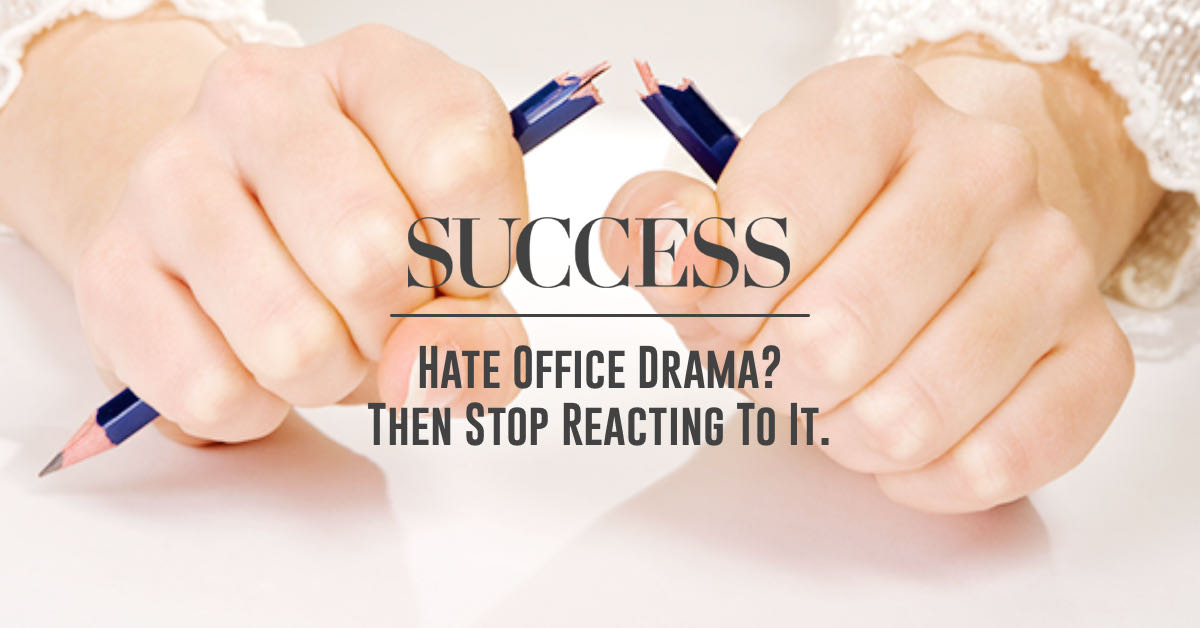Hate Office Drama? Stop Reacting to It
This article, written by Anne, originally appeared on SUCCESS.com
March 18, 2015
Office conflict causes stress, cuts productivity and sabotages the teamwork companies need to succeed. In fact, American workers spend more than two and a half hours each week resolving it—or at least trying to. That’s costing U.S. companies $359 billion every year, according to AtTask, a task management software firm.
But before you chalk up workplace conflict to the overdramatic one, the gossipy one, or the one who never pulls his weight, consider someone else first—you. You can help conquer office drama by becoming acutely aware of your own reactions in potentially stressful situations.
As a corporate leadership consultant, I lead workshops on professional development, covering topics like communication, conflict resolution and team building. One of my recent participants complained to me that every time she had a one-on-one with her supervisor, it was only a matter of time before emotions ran high and the conversation went downhill. She felt it was his responsibility to keep the conversation productive and resented having to walk on eggshells.
I suggested she step back and think about her own triggers, reactions and emotions. Just as she felt her boss could turn their conversation sour with one wayward comment, she could keep interactions with her boss positive and professional. But she had to be willing to own the communication and be deliberate about the way she approached her boss.
The truth is we’re emotional human beings who react to certain triggers. It’s in our human nature, but there are ways to get out of that reaction mode. Here’s how:
#1 Stop Reacting
Realize that when we react, we relinquish control. We let our emotions override our intentions, and we become emotionally hijacked. You know your cranky boss is a source of drama, so don’t let him or her have that control over your actions and your emotions. Learn to stop yourself from reacting.
#2 Identify Your Triggers
Triggers are those things that provoke you to have knee-jerk reactions. If you know you are going into a meeting with a difficult co-worker, take time beforehand to think about your likely triggers. If you expect them, you can plan the best way to approach the situation. Once you know what tends to set you off—certain people, topics—you can figure out how to best manage your emotions.
#3 Understand Your “EQ”
Your emotional intelligence quotient determines the way you manage conflict, build relationships and how you are perceived. Here’s the good news. While your IQ, or intelligent quotient is more static, EQ may be developed and strengthened over time as a powerful source to draw from. Carve out some time to assess your EQ; it’s as easy as searching the term “emotional intelligence test” to find one.
#4 Discover Your Blind Spots
Your blind spots are the areas of your personality and behavior that you’re unaware of. For example, you might think you are perceived as professional, but your co-workers might perceive you as standoffish. Ask for feedback from trusted friends, family and colleagues about your strengths and areas in which you can improve.
#5 Pay Attention To Your Emotions
Think about emotions that detract from your effectiveness (annoyed, angry, gloomy, anxious, fearful, nervous) versus ones that enhance it (joyful, playful, inspired, adventurous, grateful, amazed, imaginative, cheerful). What percentage of the day are you in a “good mood” versus a “bad mood”? What percentage of your day are you happy or down? Make conscious decisions about how you’re going to show up—because it matters. You get to decide the kind of mood you are in, and that will translate to the people you work with.
As you become more self-aware and learn to master your emotions in the moment, your professional relationships will flourish and you’ll become more effective and productive at your job.

Anne Grady is a Speaker, Author, and #TruthBomb Dropper.
Anne shares practical strategies that can be applied both personally and professionally to improve relationships, navigate change, and triumph over adversity. And she’ll make you laugh while she does it. Anne is a two time TEDx speaker, and her work has been featured in numerous media outlets, including Harvard Business Review, Entrepreneur, Forbes, Fast Company and Inc. magazines, CNN, ESPN, and FOX Business. She is the best selling author of 52 Strategies for Life, Love & Work and Strong Enough: Choosing Courage, Resilience and Triumph.

